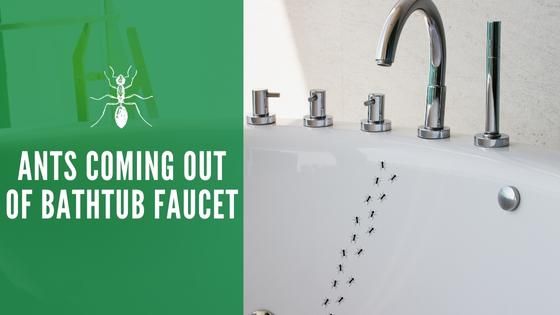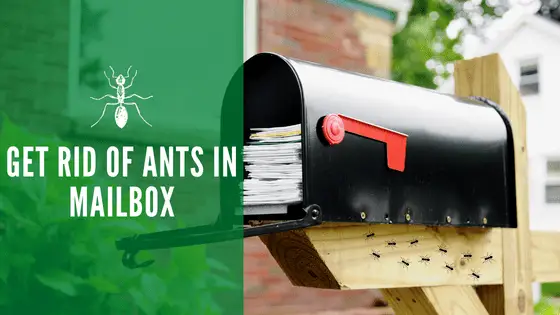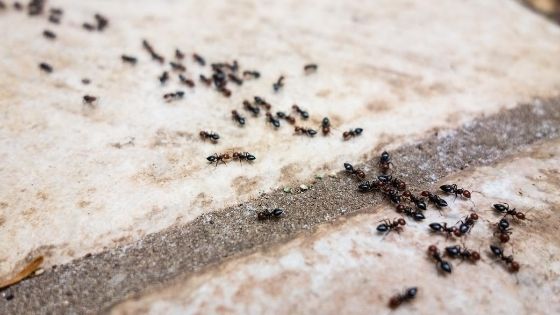Ants Coming Out of Bathtub Faucet

The bathroom in your home should feel like a beautiful oasis where you can retreat from your day in a peaceful and clean environment.
Discovering ants climbing out of the faucet destroys that peace, but you don’t have to worry. Ending ant infestations in the bathroom isn’t too hard, once you know what you’re up against.
How Do Ants Get Into Water Pipes?
With an estimated population of over 10 billion, ants technically outnumber humans. Considering that fact, it isn’t hard to see how they could wind up just about anywhere. Ants are usually extremely small, making it easy for them to slip through the tiniest cracks.
Ants may crawl into the faucet through the plumbing system. Or, they might find their way there from another route, such as from under the cabinet or inside the wall.
You’ll be able to figure out how the ants got there as you begin your bathroom investigation to end the infestation.
What Attracts Ants to Bathtub Faucets?
Ants need water, just like other living creatures. Certain types of ants, such as ghost ants, are especially drawn to faucets, where they can find an abundance of moisture to help them survive. Check out this video of how ants drink water.
https://www.youtube.com/watch?v=a3SKwQ8aBMw&ab_channel=RadioTehran
There is also the possibility that certain scents have brought ants to the bathroom. If you enjoy a glass of wine as you lounge in the tub, then it is possible that a spill generated an aroma that attracts ants.
Bubble bath and other scented products can also smell like potential food sources for ants. As you work on eliminating the infestation, you’ll also want to think about what brought the ants to your home in the first place.
Can Ants Damage Bathroom Plumbing?
A tiny little ant might look like it won’t do much damage, but they can cause plumbing problems and other issues in a building.
Ants might decide to build their nest somewhere in the pipes, which is more likely to happen in a bathroom that doesn’t get used too often. Over time, a large infestation of ants in the bathtub faucet could lead to clogged drains as they go down the line.
You’ll also want to avoid blaming ants for a problem since their sudden arrival could be a sign that there has been an issue with the pipes or fixtures for a while. Seeing ants falling out of the faucet is a good sign that you must reach out to a plumber.
Will Ants Spread to Other Parts of the House?
The ant infestation could expand beyond your bathroom in a very short amount of time. There is also the possibility that ants from another part of your house have finally made their way to your bathroom. Ants are commonly found in garages, kitchens, and patios.
The only way to know for sure is to arrange for a professional pest inspection. Pest technicians know how to check every nook and cranny of your house to identify areas where the ants might be nesting.
Getting Rid of Ants In Faucets and Bathrooms
Ants don’t belong in the bathroom, and allowing them to stay can lead to painful bites and allergic reactions. Getting ants to stay out of the bathtub faucet is possible, but you’ll need to use a multi-step process to cover all possible reasons why they disrupt the cleanest space in your house.
Flush the Ants Out
The first step that you can take is to get as many ants as possible out of the faucet. Open the bathtub faucet up as high as it will go. The pressure will help push any ants hanging out inside to the drain. Using the hottest water possible might even help to kill a few of the ants as they come pouring out of the faucet.
Clean the Drain
Once you’ve flushed the ants out, you’ll want to move to the drain where they’ve settled. Depending on the species of ant you have in the bathroom, they might’ve survived the initial flushing.
Now, you can use drain cleaning products to kill the ants while eliminating potential nests. A simple mixture of vinegar and baking soda can often help to flush out minor drain clogs, and you can follow this up by flushing the drain with hot or boiling water.
This method also gets rid of potentially odor-causing materials that are in the drain that could attract ants. For instance, residual traces of toothpaste might contain sugar that is attractive to certain ant species.
Reduce Moisture in the Bathroom
Once you’ve eliminated the main group of ants, you’ll want to start working on making sure that they don’t return. You can start by looking for leaks and other moisture sources in the bathroom. If necessary, arrange for a plumber to fix water leaks. You might also need to vent the bathroom better after you bathe or shower.
Check the Pipes for Cracks
If you only see ants crawling out of the faucet and nowhere else, then there may be cracked pipes somewhere down the line. Outdoor ants may find their way into the pipes through cracks that develop close to their colonies.
A pest technician might be able to locate cracked pipes on exterior parts of the plumbing system by following ant trails. In some cases, you might need a licensed plumber to perform a video inspection to check for cracked pipes underground.
Use Caulk Around Fixtures and Cracks
Over time, the caulk around plumbing fixtures can wear out and allow for pests to get inside. Once you’ve eliminated the ants, you can put caulk around the fixtures to prevent future infestations.
Eliminate Food Sources

Most likely, you don’t spend a whole lot of time eating in the bathroom, but there may be food sources available. For instance, the ants might be feeding on tiny spots of toothpaste on the counter, or you might’ve left a coffee ring while you were getting ready for the day.
Cleaning up these small bits of potential food can stop ants from viewing the bathroom as a comfortable place to stay.
Use an Insecticide
You’ve got multiple options for killing the ants, and you might want to use more than one method to end the infestation as fast as possible. Ant baits are an option that you can use to kill ants on the spot, but you’ll want to place them in areas where you expect the ants to visit. They may also only work on certain types of ants, so you might also need to plan for widespread spraying.
When you find ants in the bathtub, don’t assume it is just a one-time event. Ants only move to areas where they think they have a safe place to eat, drink, and build colonies. Working just as fast to start eliminating them as those house ants can move helps you get back to relaxing and enjoying a soothing bath that doesn’t include an insect audience.



